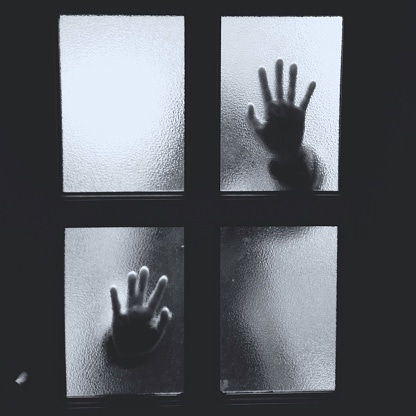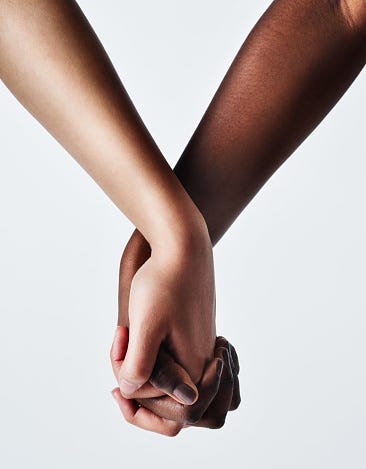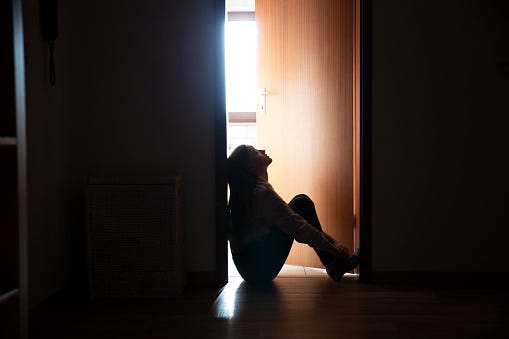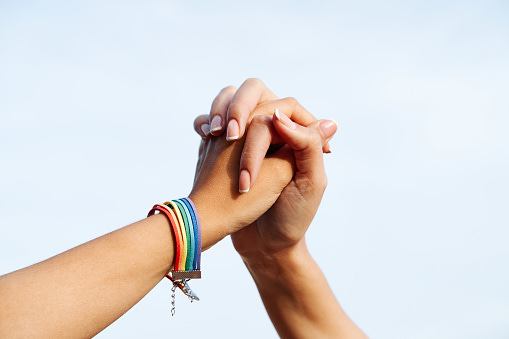Parental Guidance: I have heard from some parents that their children love reading Womaning. As much as that makes my heart somersault with joy, I should warn parents that the posts of February 2022 deal with the subjects of love and sex and have strong language. So parents, please pre-scan these posts, and do your thing. ❤️
Hello ji,
Welcome to Part 4/4 of the Month of Love series.
Phew. Finally made it to the end!
Earlier this month, I got a text from a mother. She had just read one of the pieces about online dating, and said she was worried sick. She wondered how her little daughter would fare when she grows up and enters this crazy world in search of romantic love.
This mom inspired me to make the fourth piece in this series one that leaves more moms happy than concerned.
In that spirit, I spoke to some women this week who waded through a lot of darkness before they found the light of love. But when they did, it was a love that led them to themselves.
“She makes me feel loved like I never thought was possible”
Chitra - whose story I wrote about in this piece - was kind enough to share another aspect of her life with me for this piece. Her love story.
“A and I met online on a dating app called Delta. Both of us had had bad experiences before of being ghosted or mistreated in different ways. And at least in my case, I had concluded that it was due to me being a trans woman. So I was pleasantly surprised when it didn't matter to A at all.”
“We seemed very different from each other, but we couldn't help being attracted to each other and committing to each other within 2-3 weeks after our first chat.”
There was one little hiccup - Chitra and A lived on opposite sides of the country.
“When the pandemic began, we spent 13 months not seeing each other! During that time, we used to say to each other that if Veer and Zaara could stay away for 22 years without any phone calls or video calls or not even knowing that the other one is waiting, then we can wait for a year or two!”
They remained in a long-distance relationship for 17 months.
“I visited A twice in a span of two months just before the pandemic and lockdowns, but for almost 13 months after that, we were limited to texts and phone calls and video calls. And then we decided to move in together, just before the second wave of Covid. A moved to my city and we have been living together for more than 10 months since then.”
Chitra also has a child of preschool age.
“For about a year now, my kid has been calling A Oja which means mother in A's language. They get along really well!”
“Many people who see A and me still focus on how we are visibly different from each other. But we prefer to focus on what we have in common, what binds us together, and on the life that we want to build together.
She makes me feel wanted and loved as my true self, in a way that I never thought was possible.”
“I have never felt so safe, so comfortable being myself around anyone before.”
Garima was in the final year of her graduation when her parents began talking about her marriage.
“I come from a rural background. Even though my mother was the Principal of the local school - and I was about to take over the reins from her - women are married early in our community. My father is a businessman. One of the business families he worked with approached him, asking for my hand in marriage, and they agreed.”
No one really asked for Garima’s consent. She resisted at first, but then made her peace with the new reality.
“I asked the family if they would be okay with me working and studying further after marriage and they seemed quite supportive. That made them seem like a supportive family, and they had always been quite nice towards me in general. So I convinced myself that it might be a good alliance. Not that anyone asked me anyway.”
Soon after her marriage, though, Garima realized some dark truths about her new family.
“I realized that my husband was barely educated. My father-in-law was aged and my mother-in-law handled all the family finances with an iron fist - keeping even her own son out of them. He did not have a bank account. He had never held a job. He barely stepped out of the house and was not aware of how most things worked in society. ”
Garima’s quality of life quickly went from bad to worse.
“That house was very creepy, and living there became torturous very fast. Not only did my in-laws go back on their word of letting me pursue a job or higher studies, they even curtailed my most basic freedoms. I was not allowed to eat what I wanted, wear what I wanted, go where I wanted. Basic requests like wanting to see my parents led to a barrage of cruel and obnoxious language.”
The more Garima tried to adjust, the worse the cruelty grew.
“I realized they were making me a prisoner in the house - like my husband had been all his life. I tried to get him to see this but he simply could not imagine a different life. One day, while searching for some documents, I found his 10th standard certificate. I was horrified to learn that I had been married to a man who was not even 21. My entire marriage was illegal. I packed three pairs of clothes and ran away from that house in the middle of the night.”

Once she was out of her in-laws’ clutches, Garima tried to seek shelter with her parents.
“I realized, then, that the real villains of my life were not my in-laws - it was my own parents. How could I complain against that other family when my own turned me away in my greatest time of need? They called me names, even questioned my character. It broke my heart.”
Garima says that the only thing that kept her afloat through this turbulent time was the fact that she had some savings.
“I had been working all through college. I had about one lakh rupees as savings in my bank. Fortunately, I had managed to keep this out of my parents and in-laws’ knowledge, so I had some base to launch my career off of.”
She moved to another city, took up the first job she got and joined an online course to upskill herself.
“Things went well for about a year. But then, my boss started harassing me and demanded a relationship with me. I was alone in a city where I did not even speak the local language. He was well-connected, and had started getting forceful in his advances. I had no choice but to quit the job and - once again - leave a city for my own safety.”
Garima said this was her lowest point.
“I have what some might call a beautiful face. People say that beautiful women have an easy life. But sometimes I feel like my face is my biggest enemy. My in-laws chose me because they thought I was beautiful. My parents questioned my character because they thought another man might have found me beautiful. And my boss harrased me for the same reason.”
This was one of the rare occasions in the history (herstory?) of Womaning that I felt compelled to interrupt a woman in the middle of her interview. I told Garima that people who treated her poorly were responsible for their own misdemeanours (and crimes!) and that she must resist the urge to blame herself for their choices. I cannot even imagine what this amount of trauma does to a person, but blaming oneself seems like a legitimate symptom of the psychological damage it would do. I recommended that she seek therapy to process the trauma she has been through, and she agreed that it might help her heal.
Fortunately, her story takes a happier turn.
To work out her next move, Garima met a group of her college friends who were vacationing in a city close to her.
“I took this time to ponder over my choices. I felt like I should go back to my parents’ house to work things out with them, but the very thought of it filled me with dread. It was the last day of our holiday, and I was taking a solitary walk on a beach, weighing my options.”
“And then I saw her: Neena. She was sitting alone at the beach, and I felt instantly drawn to her. I went up to her and started a conversation, and found that it was really easy to talk to her. Hours went by and we kept talking. We exchanged phone numbers. Later, even as I did go back to my parents’ house, we kept talking everyday.”
Meanwhile, as Garima tried to work on mending her relationship with her parents, they did not seem to be in a reconciliatory mode.
“One day, we had a fight. My parents told me that I should not expect to inherit anything from them. When I told them I was not interested, they said ‘tum toh hamare tukdon pe pal rahi ho’ (you are living on the morsels we throw your way). I called up Neena, crying, and told her what had happened.”
“The next day, she called me and said she had landed at the nearest airport. She told me to pack my bags and meet her there. She was flying me back away with her.
I could not believe it. I was so used to being alone in this world without any support. No one had protected me like this before. Finally, I had someone I could count on. I knew then that I loved her.”
Garima says that looking back, it seems obvious to her that she would love a woman.
“When I think back to it, I have always felt little interest in the men around me. Even when I briefly dated a man in college, I never felt anything this powerful. My husband was just a duty I was serving, until I wasn’t. A woman from my community would never have the option of not marrying a man so the thought never even occurred to me. But it seems plain as day in hindsight.”
Garima spent the next few weeks living in Neena’s parents’ house - where she stayed until she found a job and could afford a place of her own.
“Neena literally nursed me back - physically and emotionally - from the abyss I was in. I could show her my scars and she would not flinch. We have our good days and bad days like any other couple. But I have never felt so safe, so comfortable being myself around anyone before. No one has ever loved me the way she does, and I know that no one can love her the way I do.”

“I feel proud that we are so good for each other. We know we put in the work.”
Parul identifies as a biromantic asexual person. She also identifies as a happy person today, but that wasn’t always the case.
Her story begins with a six-year-long relationship with her college boyfriend.
“We met in college, and we were together ever since. After graduating, we both worked for a few years. And then, his job took him to Boston. Incidentally, I got into a Ph.D. programme around the same time and moved to Boston as well. Our parents knew about our relationship. Everyone – including us – assumed it would lead to marriage.”
But as they grew up, following their own paths, they also realized they were growing apart.
“We were becoming very different people. We started having communication problems, we found ourselves falling into some toxic patterns. I thought we were becoming like those shitty caricatures of relationships that people joke about – the woman nags, the man doesn’t listen, etc.
By the end of it, I was clinically depressed.”

There was another factor that made Parul feel like continuing in the relationship would no longer be fair to herself or her then-partner.
“I was beginning to come to terms with the fact that my sexual orientation was different than what I thought it was. It was changing and growing, and I could no longer deny that I did not feel the kind of attraction I should towards a partner. By the end, I would not even like it if he hugged me.”
For years, Parul explained it to herself as her fear of pregnancy.
“But even when my then-boyfriend and I would try other forms of intimacy, I would lose interest halfway. The next day, I would think, ‘I don't think I really enjoyed that.’ And I never really told him about any of it. I spent years, traumatized and afraid that something was very wrong with me.”
After her relationship ended, Parul decided to take some years off dating, and focus on her own mental health instead.
“After that, I was completely off dating for a long time. I started going to therapy, took the medication I needed, and came out to my parents as mentally ill and depressed. It was grueling. I was scared out of my wits. I wondered, ‘Will they be disappointed? Will they not want to know me anymore? Will something change between us forever?’ I have always been very close to my parents, so I was afraid of losing that relationship. It took them some time to wrap their heads around what I was saying, but fortunately they were really supportive once they did. They were also sad about my relationship ending, but they also thankfully prioritized my health over their expectations of my love life.”
As she started getting to a better headspace, Parul also started educating herself about her sexuality.
“I realized that I am not allo sexual - which is to say, I don't feel sexual attraction very easily. Even in college - where everyone in my friend circle seemed to be talking about and having sex - I did not feel the same kind of urge myself. It took me a while to come to terms with the fact that I was on the asexual spectrum - that I didn't feel sexual attraction as much as other people, and sex is not as important for me as a means to convey romantic interest. I started meeting other people with alternative sexualities. Such communities are quite vibrant in the US, and for the first time in my life, they made me feel like nothing was wrong with me.”

Gradually, Parul started making friends and the community made her feel like she belonged.
“I grew up at a time when we used to throw around the term ‘lesbo’ either as a joke or a pejorative. Seeing and meeting queer couples for the first time exposed me to a whole other world - full of love and sensitivity.
I started feeling more comfortable identifying as queer, and came out to my close friends. I was lucky that nobody was very awful about it, and most of them supported me. Coming out to my parents was a huge deal for me, and I prayed a lot before doing it. But once I did, I felt finally free.”
While Parul celebrated recognizing and embracing her true self, she was still afraid to start dating again.
“I was happy, but had given up on any aspiration to ever have a relationship. It is really hard for people to understand what being in an asexual relationship might be like. It is understandable because how do I explain to someone that I might not want to have sex with you, but it has nothing to do with how much I care about you? It was a pain point in my last relationship and I did not want to go through it again.”
A few years later, Parul moved back to India.
“I was eager to start meeting Indian queer people because I did not want to have to go back in the closet again. And I don't want to pretend again. So I started going to as many events as possible. I also found this wonderful app called Lex – specifically designed by queer people, and for queer women, non-binary and trans people to make friends and date.”
Parul saw a woman’s profile there, who caught her eye.
“She had an Instagram account linked to her profile, and I found her posts really beautiful and interesting. But she was clearly looking for a romantic connection, so I was hesitant to ping her. But eventually, she reached out to me and we got talking. We exchanged emails, bonded over common interests, and laughed a lot over memes we exchanged.”
“Eventually, we both accepted that we were flirting. Talking to her made me realize that I did always like women. I recognized small things in my past – like how I used to feel jealous of a close friend’s boyfriend. There were many such things I felt for other girls which I had boxed under ‘friendship’ but were clearly more than that in hindsight. You have no idea how many memes there are on the internet about the erasure of lesbian relationships under the guise of ‘close friendships’ between women – it makes it very hard, even for two lesbian women to figure out if the other is romantically interested or just very friendly. We danced around it a lot ourselves, but had to eventually accept that we had feelings for each other.”
But the pandemic and the distance between them made meeting impossible. And Parul being asexual was still something they had to discuss.
“We kept saying, ‘let's see what happens’. But we were really growing closer and talking every day. I really liked the sound of her voice.
I did not think it would work out because I am asexual, and she is a very sexual person. But, when I told her this, instead of giving up on us, she started educate herself about asexuality. She would ask me a lot of questions – like ‘do you like this’ or ‘do you want that?’ I was touched that she was making such an effort. It was helping me realize my own boundaries more clearly as well.”
Eventually, they met and started getting more clarity on navigating their relationship around each other’s sexual preferences. Meanwhile, Parul continued to struggle with her mental health, and found her partner to be incredibly patient about it.
“There were times I would text her, ‘Listen, I'm having a total breakdown, I don't think I'll be able to be on my phone at all’. She said that the fact that I was being so vulnerable and honest with her also inspired her to shoot straight with me and be upfront about her own feelings. It has set up this wonderful foundation for our relationship where we always, always discuss the difficult stuff.
“Nobody had ever been that astute about understanding my emotions before. Not only was she willing to discuss everything, she never shamed me once. She said what I was going through was totally natural, and never judged me for a minute. And this has laid such a strong foundation for our relationship. We feel completely comfortable discussing our deepest, darkest fears and insecurities with each other.”
A beautiful relationship is being built on this strong foundation as Parul and her partner have started including their near and dear ones in their relationship.
“I am very, very grateful to my parents for being so supportive. They recently invited her over to our place for a meal, and met her for the first time. That was a huge, huge step on the part of my family. Her mom and brother know about us too and are very supportive. Her dad doesn't know but that is a relationship she is still figuring out, and I am happy to be here for her patiently, like she has been there for me.”

“We still live in a country where we cannot be partners publicly. It is sad that we have to hide our truth - for our and our families’ safety. But right now I am happy that people who truly matter to us know and support us. And I feel proud that we are so happy with and so good for each other. We know we put in the work. We know we communicate. We fight, we make up, we love each other, we give each other space - but we are always there for each other.”
And that brings us to the end of the Month of Love!
For those of you who missed them, you can find Part 1, Part 2, and Part 3 of the Month of Love series on these links.
As someone who last dated about a decade ago, it has been quite the learning experience listening to these stories and writing these pieces this month. I hope all my fellow dinosaurs felt the same way. And I hope those who are dating today felt seen.
As for today’s piece, I hope these stories warmed some moms’ hearts as much as they warmed my own.
I am sending out two newsletters today because I have a small announcement to share, which I am placing in the other one.
See you on the other side!
Mahima
❤️ Love Womaning? Show it by becoming a paid subscriber or getting yourself some choice Womaning merch.
🔥 If you are an aspiring writer - or even someone who just wants to make their emails shine - check out my storytelling course, which includes writing workshops and one-on-one mentoring to help you write better, write consistently, and launch your own newsletter.












Love love LOVED this final piece of the series! So heartwarming to see people like me overcome their troubles and find love. Gives a little hope as well. Hope you’re also enjoying your break Mahima!